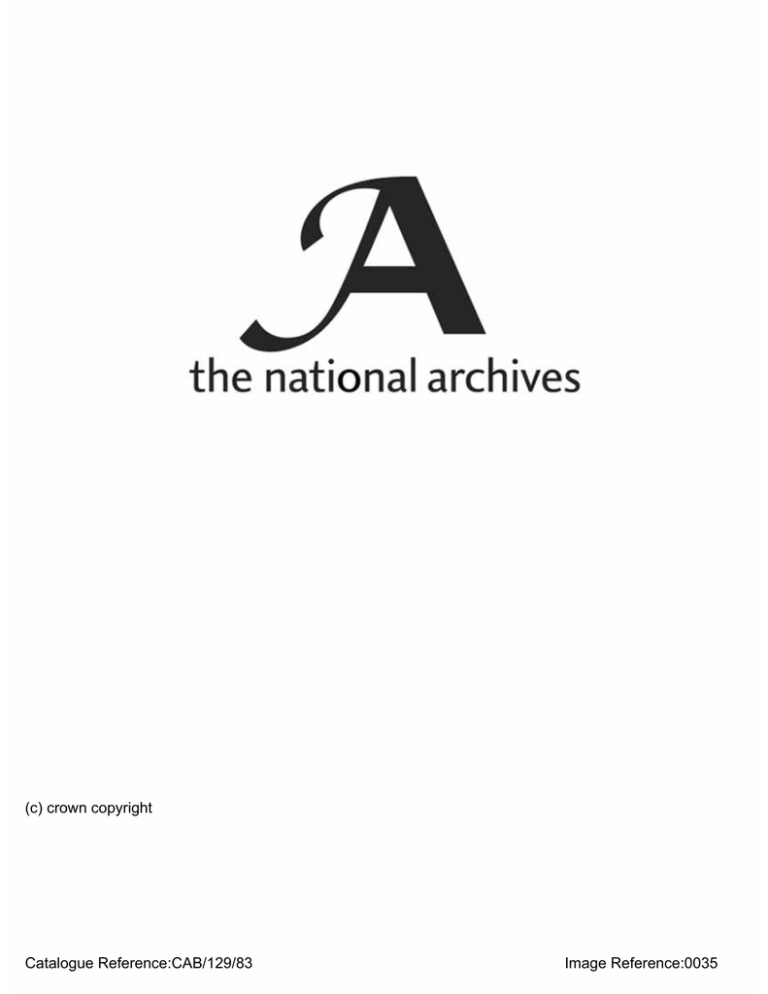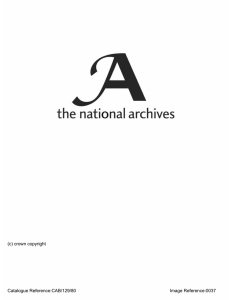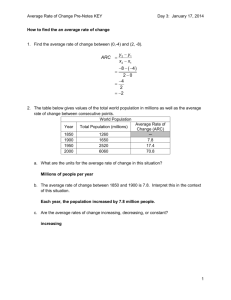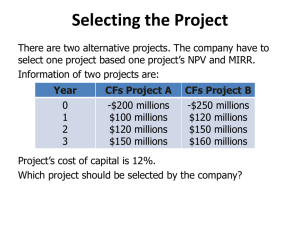(c) crown copyright Catalogue Reference:CAB/129/83 Image Reference:0035
advertisement

(c) crown copyright Catalogue Reference:CAB/129/83 Image Reference:0035 Printed for the Cabinet. October 1956 SECRET Copy No. CP. (56) 235 16th October, 1956 CABINET GOVERNMENT EXPENDITURE: ECONOMIES MEMORANDUM BY THE CHANCELLOR OF THE EXCHEQUER In my Budget Speech of last April I said that the Government had decided to put in hand a review of all Government expenditure, civil and military, in order to achieve savings amounting to £100 millions in this current year on services provided in the Estimates as published. I later explained that for this purpose I should on the one hand ignore additional necessary expenditure not provided for in the Estimates; and that, on the other hand, I would not take credit for underspendings on the Estimates during the year apart from those deliberately planned. 2. On 26th June I made an interim announcement of savings amounting to about £76 millions. Of this total, £361 millions on the defence programme, £14 millions on defence expenditure by civil Departments and £25i millions on other civil Estimates. (I understand that of the defence element" in the first £76 millions savings, some £5 millions has been, or is likely to be, lost as a result of Suez.) 3. I must announce as soon as possible after Parliament reassembles how we propose to save the balance of £24 millions. 4. Some further contributions have been agreed by Departments and some others, not so agreed, I now invite the Cabinet to approve. The total of all these is about £13^ millions, made up as follows—the items marked with an asterisk being those which I ask my colleagues to approve: — (A) DEFENCE: £ millions Army (economies in Germany) 2-0 (approx.) Navy (miscellaneous) 0-2 ,, Air (reduction of intake of manpower) 2-0 ,, w a s Total for defence (B) : 4-2 ,, CIVIL: Civil Defence (miscellaneous) Foreign Office (Jordan Loan) ... ... ... ... Colonial Office (Kenya Loan £1 million and miscellaneous) ... ... ... * Health Services: — Prescriptions (Is. an item from 1st December, 1956) Reductions of Hospital stocks ... ... ... *Milk, ordinary (increase of retail price by a further \d. from 1st January, 1957) *Welfare milk (charge to be increased by Id. from 1st January, 1957) Travelling and Subsistence (all Departments to cut the provision in the Estimates by 10 per cent, of five-twelfths, i.e., a cut of 10 per cent, in the average monthly rate of provision from 1st November, 1956) Total for Civil TOTAL FOR DEFENCE AND CIVIL 50654 0-3 0-75 1-25 0-75 0-5 4-5 0-7 0-5 9-25 13-45 (approx.) 5. On the items marked with an asterisk above, I would make the following comments: — Health Services.—The total net cost of the Health Services is over £500 millions a year. This large and annually increasing expenditure has so far made no contribution to the £100 millions saving (apart from about £500,000 on civil defence). The proposal to increase the prescription charge from Is. per form to Is. per item was exhaustively discussed in the Social Services Committee who agreed to put it forward to the Cabinet. I think it is now time to decide that this change shall be made: it cannot seriously be argued that it will cause hardship in any quarter. In my view there is a strong case for an even bigger increase. The number and cost of National Health Service prescriptions is still rising sharply and this year's Estimate is Hkely to be exceeded by £3-4 millions on this account. The saving from the new charge in a full year would be over £5 millions. On hospital stocks, which are in some cases clearly excessive, I would propose to take credit for this year's saving from a process of reduction which the Minister of Health has already pressed on the hospital authorities. Milk (ordinary).—I explained in my Budget speech our general attitude to the food subsidies—that it does not make sense artificially to cheapen the prices of bread and milk for everyone irrespective of need. In present circumstances, when one of our principal troubles is excessive personal consumption, it is particularly foolish to do so. The subsidy now remaining on ordinary milk amounts to about \d. a pint, costing £22 millions a year, and I am sure that we ought to get rid of it at a fairly early date. I propose that officials should work out proposals for increasing the retail price by \d. - a pint from 1st January, 1957, and for dealing with any remaining difficulties in the way of finally removing the subsidy. A further increase of \d. a pint in the retail price would add 0-22 of a point to the Index of Retail Prices. The Index has been steady since April, with a slight trend downwards and, even with the proposed increase for milk, it is likely by the end of the. year to be well within the increase of 2-3 points over this year, to which I referred in a public speech in May last. Welfare Milk.—At present the charge for this milk is \\d. a pint, compared with the ordinary retail price of l\d. a pint. The charge has remained at \\d. since 1946 when the full retail price was only A\d. An increase of Id. in the charge for welfare milk would cover the \d. increase in the price of ordinary milk made on 1st July and the further increase of %d. proposed above. The total charge would then be 5d. below the present full retail price and 5\d. below the new retail price if the latter were increased by the further \d. proposed above. This difference would still be adequate recognition of our desire to encourage the consumption of milk by young children and expectant mothers. Travelling and Subsistence.—This proposal explains itself. I cannot think that any department would be unreasonably handicapped in the discharge of its functions if it restricted its travelling by one-tenth for the remainder of this financial year. Travelling and subsistence costs are one of the items in the Estimates which are most criticised, however uninformed such criticism may sometimes be. 6. The need for further immediate economies.—Even if all the above proposals are approved, we shall only show £13^ millions towards the £24 millions needed, making about £90 millions out of the £100 millions. I must therefore ask all my colleagues to consider very seriously what contributions they can respectively make towards finding the balance. It is unthinkable that we should not honour our public commitment to find the £100 million. Moreover, although the unavoidable and large additional expenditure to which we have committed ourselves since the Budget on Suez and other services is outside the £100 millions operation, such additional expenditure makes it all the more urgent to make economies on the original Estimates. In particular, J -must ask that every effort shall be made to increase the defence contribution.to the £24.millions-say, by another £5 millions at least. 7. Defence policy.—I am very much concerned about the delay in settling various medium- and long-term questions of our defence policy. I realise that the Suez affair has inevitably slowed down the progress we hoped to make on these questions. Nevertheless, it is now very urgent that the studies which we put in hand some months ago should be completed quickly. If we are to make a convincing case, in the impending reappraisal of NATO policy, for changes which will relieve bur own defence burdens, we must be quite clear in our own minds what new policy we want and how we justify it. At present no such case exists, and there is grave danger that failure to have it ready in time will prejudice all we hope for from the reappraisal. Completion of the defence studies now in hand is also urgent in order that the relief which we expect from them may be reflected as fully as possible in the Defence Estimates for 1957-58. 8. General.—Apart from all the above more or less immediate problems, I must take this opportunity of emphasising how necessary it is for us to adopt the strictest possible policy of economy in considering proposals for new or extended services involving additional expenditure. Present forecasts suggest that civil Supply expenditure in .1957-58 will be some £160 millions more than the total for 1956-57 after allowing for the £76 millions of savings already announced and the supplementaries taken in July; of this increase, the social services account for £100 millions. In face of such a forecast, and the continuing pressing need to keep Government demands on the national resources to the minimum, we clearly cannot afford to incur additional commitments which are not absolutely essential. - 9. Recommendations.—I invite my colleagues: — (a) to approve the items marked with an asterisk in paragraph 4 above and discussed in paragraph 5; (b) to let me know by the end of this month what contributions they can make towards finding the remainder of the £24 millions needed; (c) to press on as quickly as possible with the studies now in progress of various aspects of our defence policy. H. M. Treasury Chambers, S.W. 1, 15th October, 1956.




